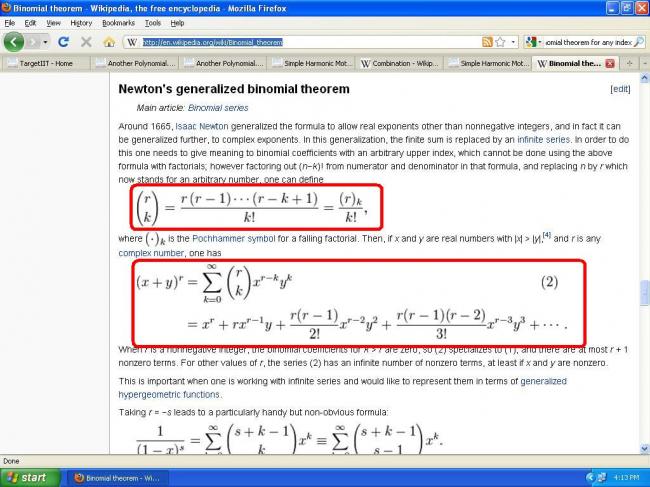 1
1this is the part missing in bhargav bhaiya's solution
here we should assume a polynomial
g(k)= f(k)-2k = 0
we observe that it is a polynomial with degree n . but as given it is satisfied by (n+1) values 0,1,2,3...n.
thus it is an identity .
=> f(k)=2k for all values of k .
thus now proceding as bhargav bhaiya.
 62
62haha.. yeah 5 out of 4 people will not understand the joke nor why 5C4=0 :P
 1
1okies sir ! [1][3]
3C4 is 0 only .
reminds me of qwerty's signature
 3
3mmm sir actually i thot of the binomial theorem written by u,but din postd some wat is missing or something i cant understand,donno how to express my dbts,frankly i am not fully satisfid with the soln,dunno y.:P
 62
62yes karna it is ...
but what is the value of 3C4 .. it is zero..
so it does not change anything [1]
@sankara.. no it just an after thought after what bhargav has done..
nC0+nC1+...nCn = 2^n is very very obvious.
but if you want that to be a polynomial, what i would do is to somehow reconstruct it as a polynomial.
so the polynomial is just looked in 2 ways.. one as karna rightly said (generalized binomial thoerem) or equivalently what i have written.
 3
3mmm i am not asking dat bro,i was asking him wat made him to get a function like dat.
 1
1@msp.the function is coming from binomial theorem for any index .

sorry i highlited the wrong equation b4 [3]
 3
3sir how to get the function,is dat by observation,or nething to think more.
 1
1okies sir......
but b555 's function is wrong as
in his function
f(3)=3C0 +3C1 +3C2 +3C3 +3C4(?)+..
but ur function takes care of the other terms by making them 0
isn it binomial expansion for any index ?
 62
62With what bhargav has done, if we could make a very small adjustment to define the function for all x and not just for integers, we can either use the alternative definition of nCr for non integers or use the following polynomial:
f(x)=1+x+\frac{x(x-1)}{2}+\frac{x(x-1)(x-2)}{2.3}+...+\frac{x(x-1)(x-2)...(x-n+1)}{1.2.3...n}
This will look like what bhargav has written if x is an integer
and with this function in mind (which is a polynomial in n degree) we proceed like how bhargav has in his post
[1]
 62
62yes karna you are right..
and that is why i posted the reservations in the next few posts...
I will give the complete proof.
[1]
 1
1sir but b555 function isnt defined for all real values..
whereas a polynomial must be defined for al real values
 62
62but 2^k is not a polynomial at all..
That is not what bhargav meant ...
 3
3sir i have a dbt wat is P(K) wat is the relation between f(x)
 62
62Bhargav are u sure it is out of syllabus?! :D
I think you have not understood the spirit of your own solution :P ;)
 3
3well i have dbt,even i thot of expanding by binomial.But i left it becos f(x) is defined for all real values of x,also the given f(x) doesnt defined for negative x na.
 39
39now the explanation i have will for sure go out jee sylabus
so i would be glad to see someone post a explanation that everyne can understand
 62
62A few things that you have not explained at all..
what was athe need of the polynomial having n roots
and why should the polynomial take the same value at n+1 ??? ?
 39
39here, we see that
f(x)=x_{C_{0}}+x_{C_{1}}+x_{C_{2}}+.......................+x_{C_{n}}
so we have
f(n+1)=(n+1)_{C_{0}}+(n+1)_{C_{1}}+(n+1)_{C_{2}}+.......................+(n+1)_{C_{n}}
=2^{(n+1)}-1
[ since here we have the sum of coefficients of (1+x)^{(n+1)} which is equal to 2^{(n+1)}]
 3
3hey dude if u know the soln,y dont u give me a hint for me,ne hint that is within the syllabus of jee.
 39
39well nishant sir , shall i finish it off or u want to wait for some more days?
between did u get the hint in what i said in #7?
i have no doubt that bhatt sir would have obviously understood what i meant.
 62
62Yes it is not...
and you have to think of something really tricky to get over this one!
 62
62no it is not.. so you have to think of something else.. [1]
 1
1sir, 2x degree not defined???
 341
341small typo. they r both the same
